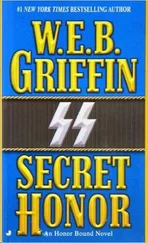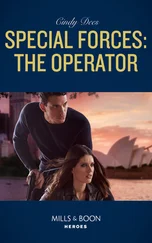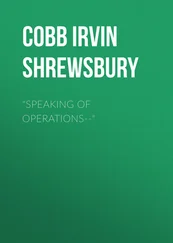W.E.B Griffin - Special Operations
Здесь есть возможность читать онлайн «W.E.B Griffin - Special Operations» весь текст электронной книги совершенно бесплатно (целиком полную версию без сокращений). В некоторых случаях можно слушать аудио, скачать через торрент в формате fb2 и присутствует краткое содержание. Жанр: Криминальный детектив, на английском языке. Описание произведения, (предисловие) а так же отзывы посетителей доступны на портале библиотеки ЛибКат.
- Название:Special Operations
- Автор:
- Жанр:
- Год:неизвестен
- ISBN:нет данных
- Рейтинг книги:4 / 5. Голосов: 1
-
Избранное:Добавить в избранное
- Отзывы:
-
Ваша оценка:
- 80
- 1
- 2
- 3
- 4
- 5
Special Operations: краткое содержание, описание и аннотация
Предлагаем к чтению аннотацию, описание, краткое содержание или предисловие (зависит от того, что написал сам автор книги «Special Operations»). Если вы не нашли необходимую информацию о книге — напишите в комментариях, мы постараемся отыскать её.
Special Operations — читать онлайн бесплатно полную книгу (весь текст) целиком
Ниже представлен текст книги, разбитый по страницам. Система сохранения места последней прочитанной страницы, позволяет с удобством читать онлайн бесплатно книгу «Special Operations», без необходимости каждый раз заново искать на чём Вы остановились. Поставьте закладку, и сможете в любой момент перейти на страницу, на которой закончили чтение.
Интервал:
Закладка:
When he went on inactive duty again, the Corps gave him a Reserve billet with the Navy Yard, as an investigator on the staff of the Provost Marshal. He generally managed to pick up two or three days of "active duty" a month, sometimes more, in addition to the one weekend, which meant that much more in his Reserve paycheck every three months. It also meant that his Corps pension, when he got to it, would be that much larger.
It was a pretty good deal, he had reminded himself, when he had failed the Police Department's Lieutenant's examination for the second time. If he had passed it, there was no telling where the Department would have assigned him, but it would have meant leaving the Academy, which he liked, and almost certainly would have kept him from picking up an extra two or three days Master Gunnery Sergeant's pay and allowances every month. The Academy had an eight-to-five, Mondaythrough-Friday work schedule. As a new Lieutenant, he could have expected to work nights and weekends.
And he liked what he was doing, and thought it was important. Sometimes, Dick Stennis thought, very privately, that if his supervision of the firearms instruction at the Police Academy kept just one cop,or just one civilian, alive, it was worth being thought of by one class of rookies after another as "that bald-headed prick."
The first time Police Recruit Matthew M. Payne had come to the attention of Sergeant Richard Stennis was during the lecture Sergeant Stennis customarily delivered to the class as the first step in the firearms phase of their training. Sergeant Stennis believed, not unreasonably, that over the years he had been able to hone and polish his introductory lecture to the point where it was both meaningful and interesting.
Police Recruit Matthew M. Payne apparently was not so affected. The first time Stennis saw Payne, who was sitting toward the rear of the classroom, he was yawning. He wasreally yawning, holding a balled fist to his widely gaping mouth.
Sergeant Stennis had stopped in midsentence, and pointed a finger at him.
"You!" he said sharply, to get his attention. "What's your name?"
Payne had looked uncomfortable. "Payne, sir."
"Perhaps it would be easier for you to stay awake if you stood up."
Payne had jumped to his feet and assumed what is known in the military as the position of "parade rest," that is, he stood stiffly, with his feet slightly apart, and his hands folded neatly in the small of his back, staring straight ahead.
That little fucker is making fun of me,Stennis decided, and then modified that slightly. Payne was not alittle fucker. He was probably six feet one, Stennis judged, maybe a little over that. And he was well set up, a muscular, good-looking young man.
Well, fuck you, sonny. I've been dealing with wiseasses like you all my life. You want to stand there at parade rest, fine. You 'II stand there until this class is over.
And Police Recruit Matthew M. Payne had done just that, for the remaining forty, forty-five minutes of the class, which served to give Sergeant Stennis some food for thought. That was the sort of thing a serviceman would do. Perhaps he had jumped the kid a little too hard.
When he checked Payne's records, however, he found no indication that Payne had ever worn any uniform but the one he was wearing now; he was not an ex-serviceman. His records indicated further that Matthew M. Payne had just graduated from the University of Pennsylvania, Bachelor of Arts,cum laude.
That was unusual. Very few college graduates took the Civil Service exam for the Police Department. The starting pay for a rookie policeman was low (in Dick Stennis's opinion, a disgrace) and a college degree was worth more money almost anyplace else.
Making an effort not to make a big deal of it, he asked other instructors what they thought of Payne. The responses had been either a shrug, meaning that they hadn't formed an opinion of him one way or another, or that he was just one more recruit, except for a few instructors who replied that he seemed smart. Not smartass, but smart. Bright. Payne had apparently given no one else any trouble; if he had, Stennis would have heard.
The first day of actual firing on the Police Academy Pistol Range was, Stennis had learned, most often one of shock, even humiliation for rookies. Very few recruits, excepting, of course, ex-servicemen, had much experience with any kind of firearm, and even less with handguns.
What they knew of pistols most often came from what they had seen in the movies and on TV, where Hollywood cops, firing snub-nosed revolvers, routinely shot bad guys between the eyes at fifty yards.
The targets on the Academy Pistol Range were life-sized silhouettes, with concentric "kill rings" numbered (K5, K4, and so on) for scoring. Ideally, all bullets would land in a K5 kill ring. The targets were set up for the recruit's first firing at fifteen yards. The weapon used was the standard service revolver, the Smith amp; Wesson Model 10 " Military amp; Police." It was a six-shot,.38 Special caliber, fixedsight weapon, which could be fired in either single action (the hammer was cocked, using the thumb, before the trigger was pulled) or double action (simply pulling the trigger would cock the hammer and then release it).
For their first live firing exercise, the recruits were instructed in the double-hand hold, and told to fire the weapon single action, that is by cocking the hammer before lining up the sights and pulling the trigger.
It seemed so easy when the recruits first took their positions.Anyone should be able to hit a man-sized target at that short range. You could practically reach out and touch the damned target. The result of this was that many, even most recruits, decided it would be safe to show off a little, and perhaps even earn a smile from Sergeant Stennis, by shooting the target in the head, a K5 kill ring.
The result of this, many times, was that there were no holes at all in the target, much less in the head, after the recruit had fired his first six rounds. Shooting a pistol is infinitely more difficult than it is made to appear in the movies.
Sergeant Stennis didn't mind that the first six rounds were normally a disaster for their firers. It humbled them; and humbled, they were that much easier to teach.
When Recruit Matthew M. Payne stepped to the firing line, Sergeant Stennis waited until he was in position, and then moved so that he was standing behind him. Payne did not look particularly uncomfortable when, on command, he looked at the revolver. He fed six cartridges into the cylinder without dropping any of them, which sometimes happened, and he closed the cylinder slowly and carefully.
Some recruits, even though cautioned not to do so, followed the practice of Hollywood cops by snapping the pistol sharply to the right, so that the cylinder slammed home by inertia. This practice, Stennis knew, soon threw the cylinder out of line with the barrel, and the pistol then required the services of a gunsmith.
Sergeant Stennis would not have been surprised if Recruit Payne had flipped the cylinder shut. Even when he didn't, he sensed that Payne was going to do something wiseass, like fire his six rounds at the silhouette's head, rather than at the torso of the target.
And when the command to fire was given, Payne did just that.
And hit the silhouette in the head, just above where the right eye would be.
Beginner's luck, Stennis decided.
Payne's second shot hit the silhouette in the upper center of the head, where the forehead would be.
I'll be damned!
Payne's third shot hit the target head where the nose would be; and so did the fourth. The fifth went a little wide, hitting the tip of the silhouette head, but still inside the K5 ring, which Payne made up for by hitting the silhouette head where the left eye would be with his sixth shot.
Читать дальшеИнтервал:
Закладка:
Похожие книги на «Special Operations»
Представляем Вашему вниманию похожие книги на «Special Operations» списком для выбора. Мы отобрали схожую по названию и смыслу литературу в надежде предоставить читателям больше вариантов отыскать новые, интересные, ещё непрочитанные произведения.
Обсуждение, отзывы о книге «Special Operations» и просто собственные мнения читателей. Оставьте ваши комментарии, напишите, что Вы думаете о произведении, его смысле или главных героях. Укажите что конкретно понравилось, а что нет, и почему Вы так считаете.











